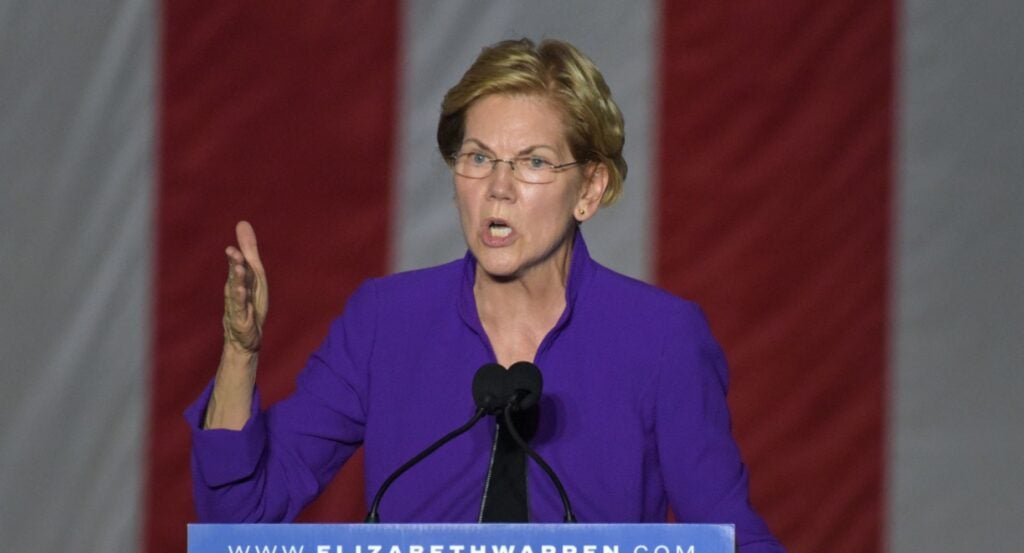The Federal Reserve’s upcoming meeting on Sept. 18 is shrouded in uncertainty, with market participants debating whether the central bank will cut rates by 0.25% or opt for a more aggressive 0.5% reduction.
Adding another layer of complexity to the Fed’s rate decision, three U.S. senators—Elizabeth Warren, Sheldon Whitehouse, and John Hickenlooper—sent a letter to the Fed on Monday urging a jumbo cut of 75 basis points.
“We write today to urge the Federal Reserve (Fed) to cut the federal funds rate, currently at a two-decade-high of 5.3 percent, by 75 basis points (bps) at the Federal Open Market Committee (FOMC) meeting on Sept. 17 and 18, 2024,” the senators wrote.
They warned that if the Fed remains “too cautious in cutting rates, it would needlessly risk our economy heading towards a recession.”
According to market-implied odds tracked by CME FedWatch, there’s a 60% probability of a 50-basis-point cut and a 40% chance of a smaller 25-basis-point cut.
There’s no chance the Fed will opt for a 75-basis-point cut, a move that has historically been reserved for crisis situations, such as the Great Financial Crisis in January 2008 or the 100-basis-point cut in March 2020.
While a 75 basis point cut seems unrealistic at this stage, some market experts are beginning to suggest that a decision to cut by 50 basis points could carry political implications, especially for President Trump’s re-election prospects.
Fed In High-Stake Rate Cut Decision As Presidential Elections Loom
Veteran market analyst Ed Yardeni indicates that the economic and political implications of monetary policy decisions are too significant to ignore.
While he highlights that “the Fed is apolitical,” – as officials have often claimed – a more aggressive 50-basis-point rate cut could potentially “reduce Trump’s chances of winning” in the upcoming election.
Federal Reserve Chairman Jerome Powell has been clear about the Fed’s independence, stating in a July 31 press conference: “We would never try to make policy decisions based on the outcome of an election that hasn't happened yet… That would just be a line we would never cross. We don't want to be involved in politics in any way.”
However, Yardeni indicates that some members of the FOMC may not be entirely indifferent to the political landscape, especially given former President Donald Trump‘s contentious relationship with the Fed.
Yardeni speculates, “some members of the FOMC strongly dislike Donald Trump,” particularly since Trump is more likely than Harris to challenge the Fed’s independence.
According to an aggregation of the latest polls conducted in September, Kamala Harris holds an average lead of slightly more than 2 percentage points over Trump, standing at 48.8% compared to Trump’s 46.35%, with 4.85% of voters still undecided.
Betting odds tracked by Polymarket show a tight race, with Harris assigned a 50% chance of winning and Trump at 49%. This narrow margin makes any economic changes between now and Election Day crucial in swaying undecided voters.
The Powell factor
Yardeni also hints at Powell’s personal motivations, noting that his term as Fed Chair expires on May 15, 2026.
If Trump wins re-election, the likelihood of Powell being reappointed seems low. In contrast, if Harris wins, Powell might have a shot at retaining his role, though a more liberal candidate like Lael Brainard could also be in contention.
Yardeni highlights Powell’s recent shift from “inflation hawk to employment dove” at the August Jackson Hole symposium, suggesting this may be part of a strategy to align with political winds that favor his reappointment.
Read Next:
Photo: Shutterstock
© 2024 Benzinga.com. Benzinga does not provide investment advice. All rights reserved.








